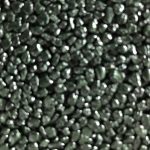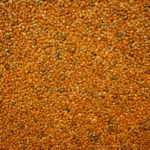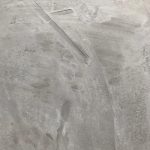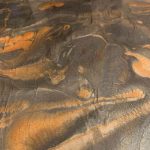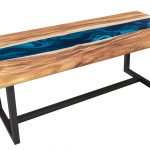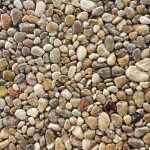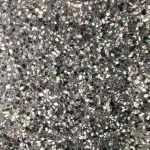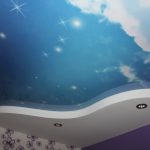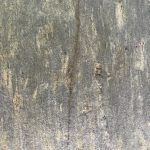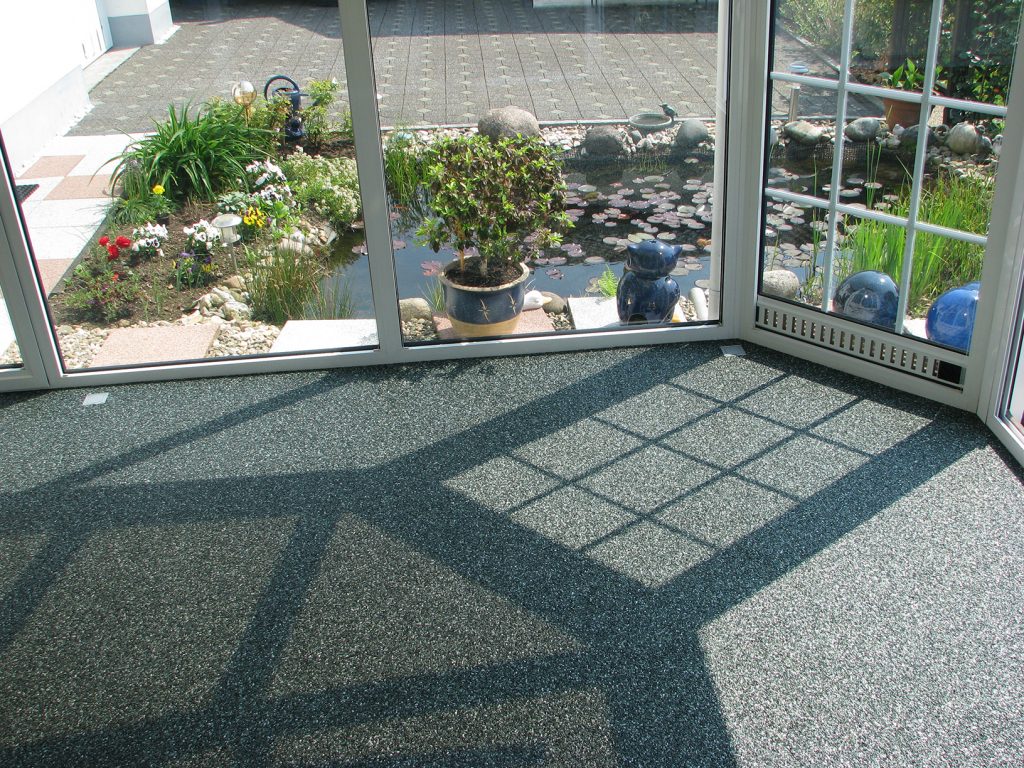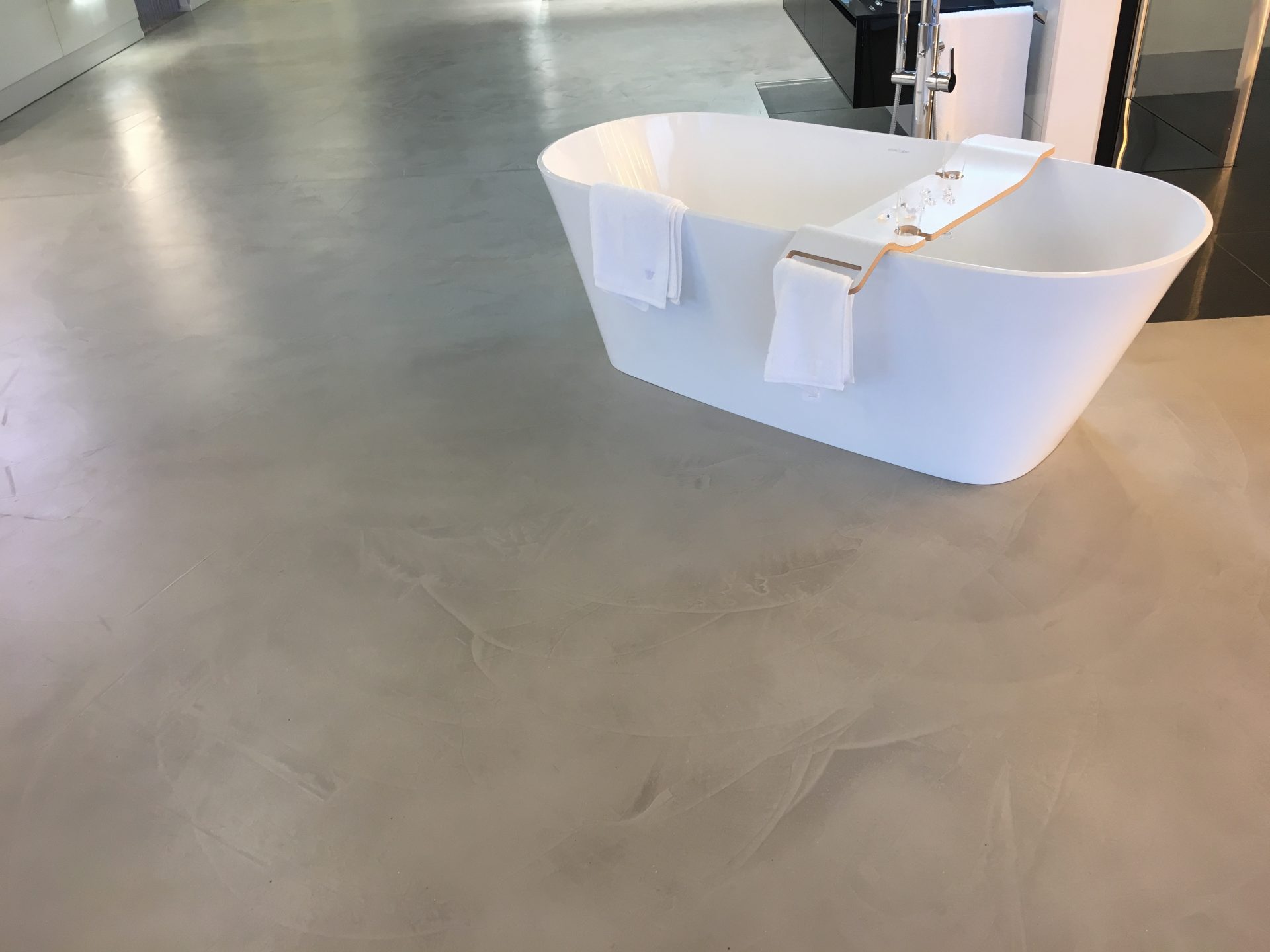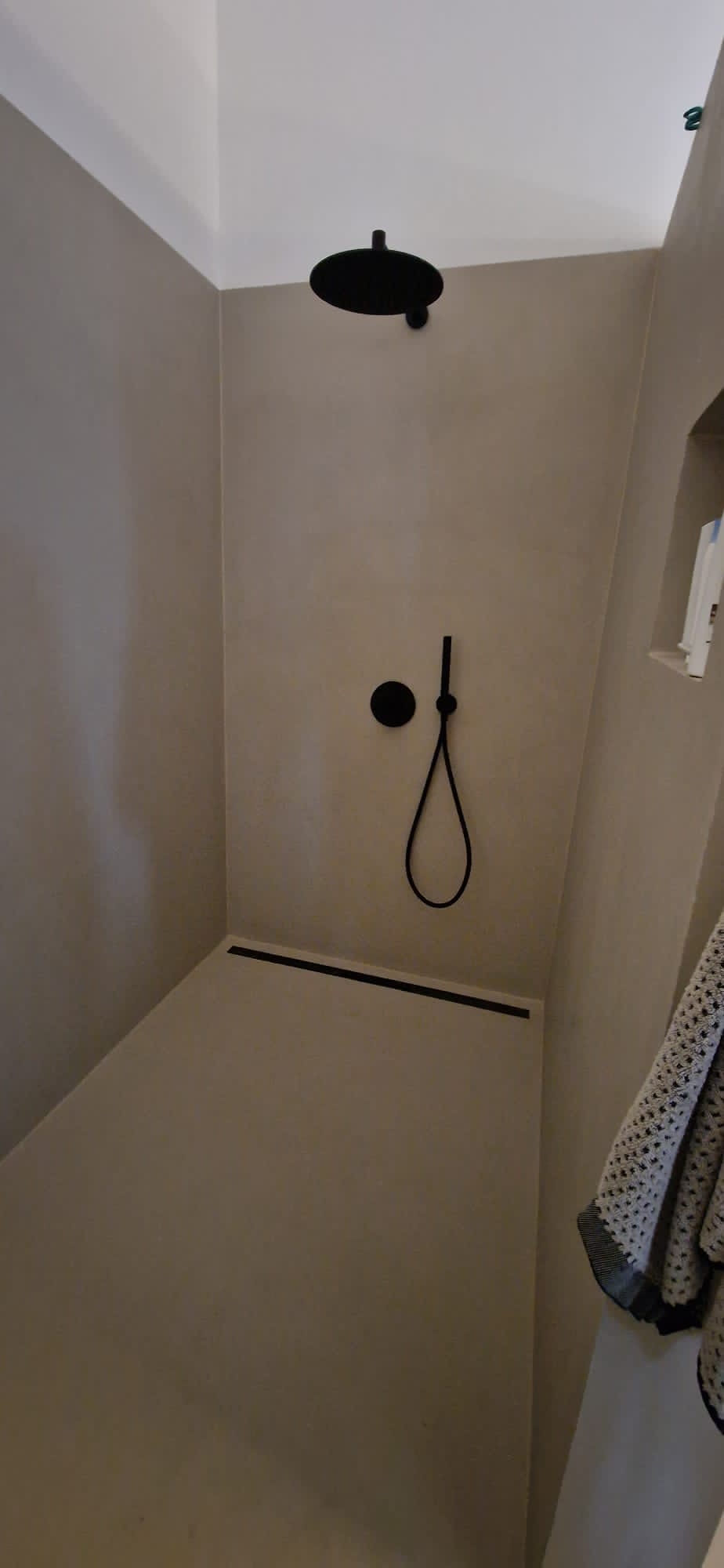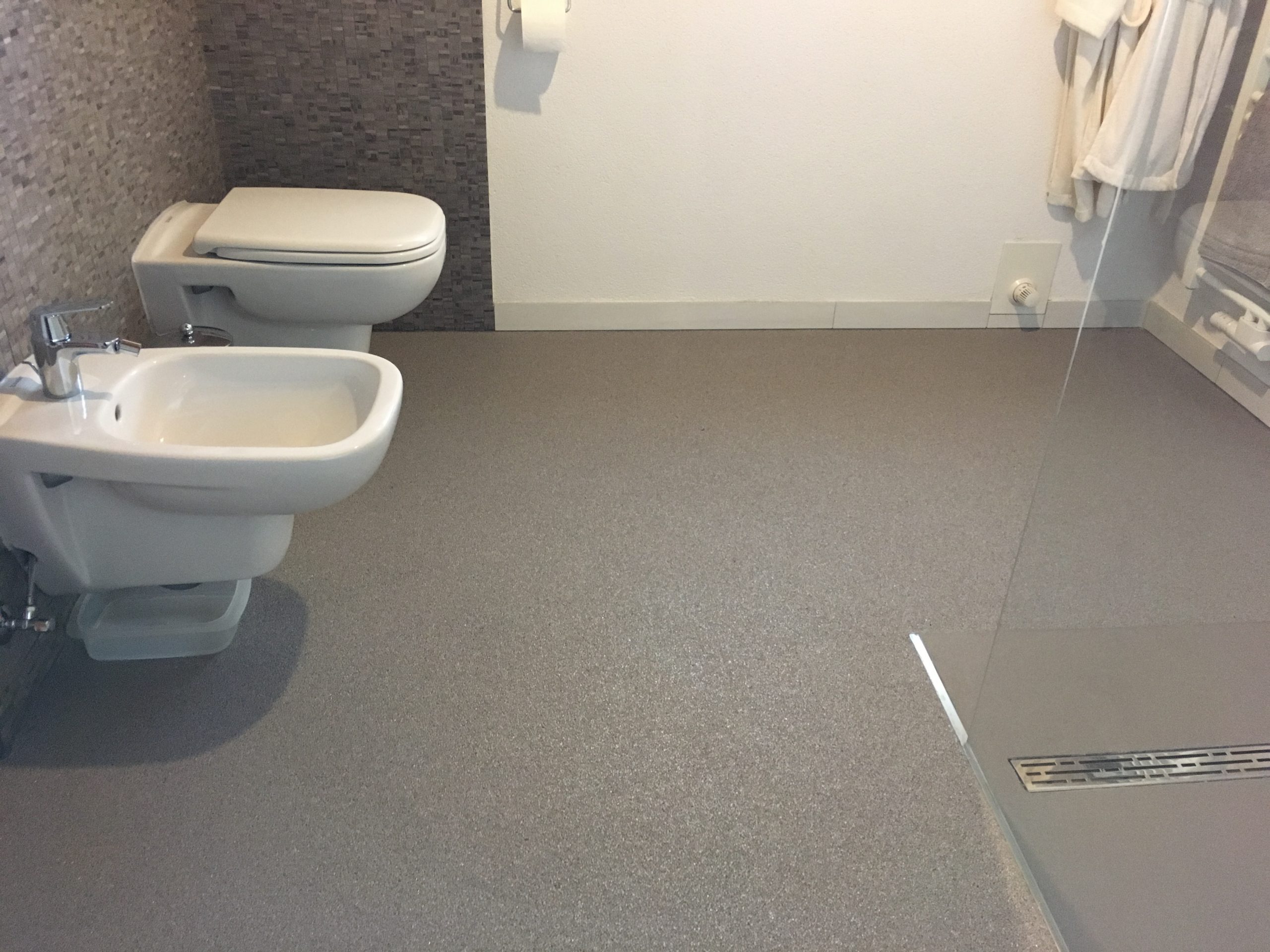In a stone carpet conservatory, you can enjoy nature all year round. Experience the seasons up close and yet be well protected. Choose high-quality and durable materials, especially for the floor. This increases living comfort and enhances your quality of life.
Why homeowners want a stone carpet conservatory Enjoying the garden in winter
A conservatory gives you the opportunity to enjoy your garden even in late summer, when it is already too cool to sit outside. The glass walls protect the interior from the cold and at the same time provide a view of nature. A garden shed can also be used as an extended living space. Winter garden stone carpet make wonderful use of it.
The conservatory occupies a special position among living spaces. On the one hand, it is often used as another living room with armchairs, a pool table or plants. On the other hand, it also serves as a transition to the garden, meaning that the floor occasionally comes into contact with dirt and garden utensils. The constant exposure to sunlight also places higher demands on a floor than in many other rooms.
It is therefore important to use a high-quality flooring system when building or renovating a conservatory. Many homeowners therefore opt for a
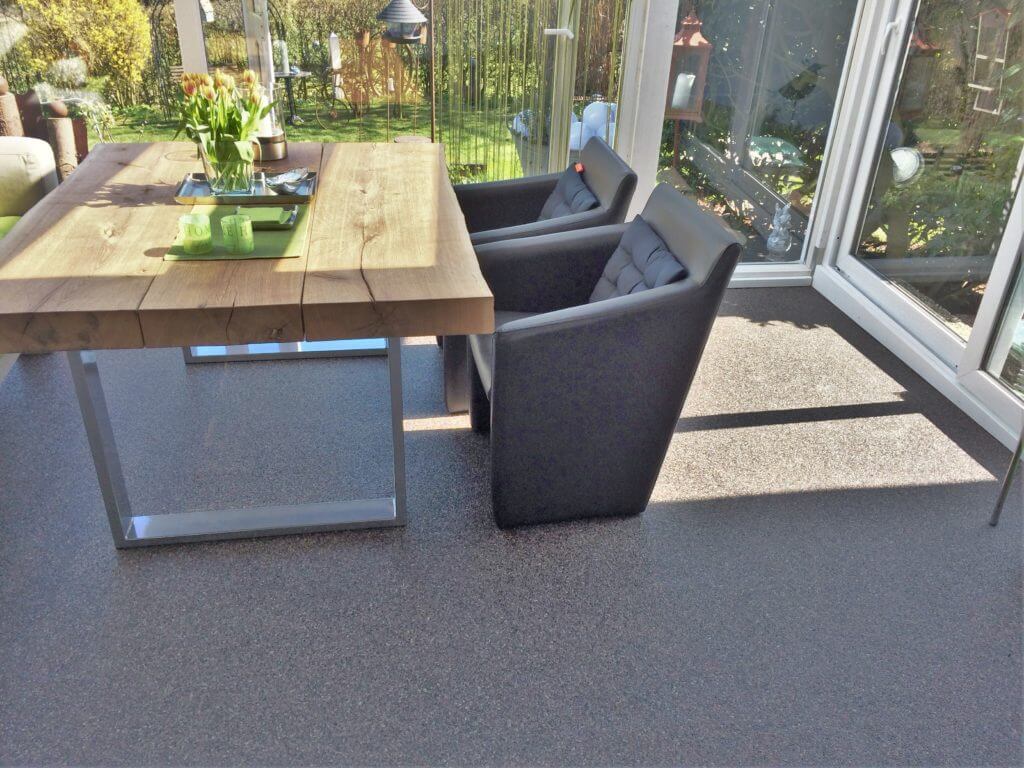
Reason 1: Durability
In general, gravel flooring is already known as an extremely robust and durable floor covering. Property owners appreciate all the positive properties when using it in living rooms, bathrooms, on terraces, stairs and in many other places.
Especially in conservatories, where the demands of indoor and outdoor surfaces need to be combined, stone carpeting is exactly the right choice. The system is very dirt-resistant and easy to clean. A gravel floor also creates an amazingly good visual connection between indoor and outdoor areas. To keep it that way, the same polyurethane-based binder is used in rooms with large temperature differences as is used for outdoor surfaces such as
Der Quarzkiesboden sowie ein Kiesboden aus Marmorsteinchen stehen für die Beschichtung zur Auswahl. Beide Varianten des Steinteppichs können offenporig verlegt oder mit einem Porenverschluss versehen werden. Die Auswahl entscheidet der Einsatzzweck: Gelangen häufig Flüssigkeiten auf den Boden oder wird viel mit Blumenerde hantiert, kann das Verschließen der Poren mit einem Porenverschluss von Vorteil sein.
Reason 2: The harmonious look
The use of natural materials is ideal as a transition from living space to nature. On the one hand, because it creates a link to nature in the garden. Secondly, because many properties already have stone carpeting laid in the other living areas. Accordingly, the stone carpet in the conservatory is the perfect link between the house and the garden.
The look of the floor can be adapted precisely to the surroundings. The many gravel colors available for marble and quartz gravel offer the right tone for every living ambience and every color mood in the garden. Combinations and individual mixtures of gravel types are also possible.
Reason 3: Dogs love stone carpets
A winter garden stone carpet is the ideal place for our beloved four-legged friends to stay. The stone structure gives dogs a secure feeling when running and playing. The heat stored in the floor, whether from sunlight or integrated underfloor heating, offers four-legged friends an ideal place to lie down.
More details on the benefits of gravel floors for dogs can be found at Steinteppich-Hund.
Which binder for the winter or summer garden? Epoxy resin or polyurethane?
In outdoor areas and in rooms with considerable temperature differences, such as unheated conservatories, the stone carpet should be laid with a polyurethane-based binder. Polyurethane remains flexible enough to prevent stress cracks even in the event of significant temperature changes and sub-zero temperatures. Especially in unheated summer gardens, strong temperature fluctuations are not uncommon.
This must be observed during installation
Before the stone carpet can be laid, the substrate must be prepared. Different steps are necessary depending on the structure of the room and the existing substrate. Existing tiles can be reworked with a stone carpet after appropriate priming. Only loose tiles and chipped areas need to be removed in advance.
When building a new summer garden, it is important to ensure that the substrate is correctly waterproofed in order to protect the stone carpet and the structure itself.
You can find detailed information on how to lay stone carpet on our page Laying stone carpet in 6 steps.
For detailed advice on your building project, please contact Quarzkiesboden Zimmermann or the Qubo® bases.
Planning a new conservatory or summer garden
Before planning, you should be clear about the actual purpose of the glass extension to the house. There are major differences between winter and summer gardens, particularly in terms of the cost of construction and the type of use.
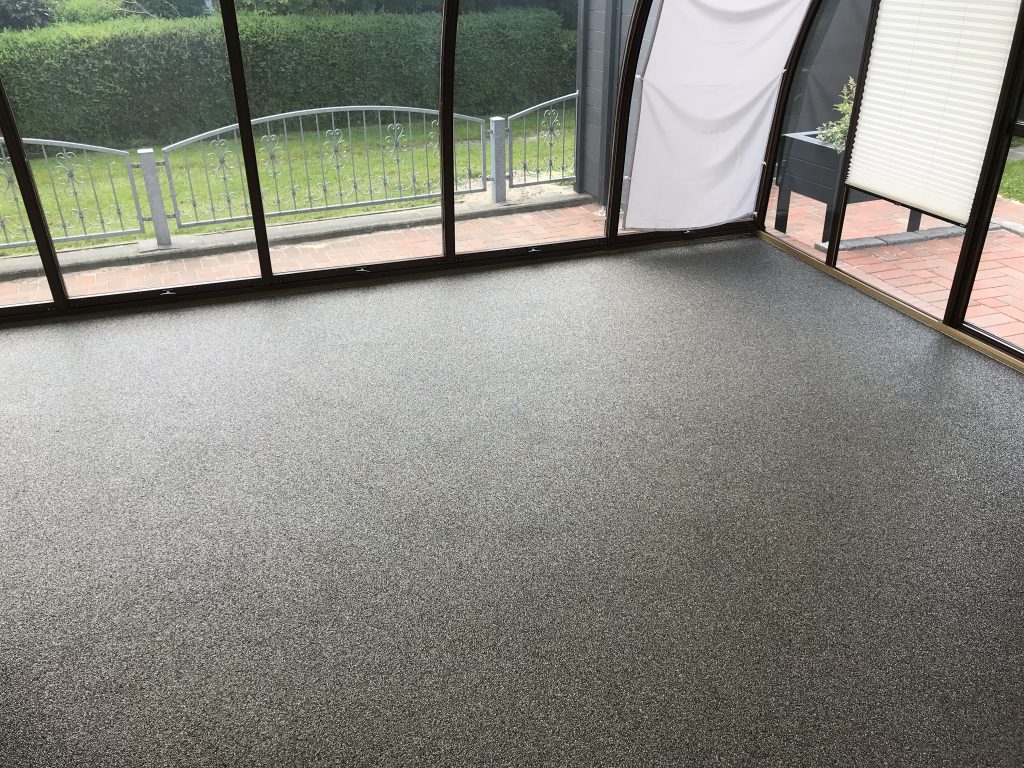
Summer garden / cold conservatory
If it only serves as an outdoor retreat and has to withstand wind and weather, a roof over your own patio with glass elements on the side is probably just the thing. This non-insulated extension is known as a cold conservatory or summer garden.
This form of conservatory extends the season of patio use. A barbecue party can be planned from spring to fall, even in cool, windy weather. If the sun is shining, it can even be used in winter. The sun’s rays quickly heat the wind-protected cold conservatory to a pleasant room temperature. So even in winter you can enjoy a cup of coffee or tea in a snowy ambience.
In winter, the conservatory also serves as a storage room. Thanks to the glass walls, the garden furniture is well protected from ice and snow and no longer needs to be covered.
Potted plants that are in the garden in summer can easily spend their winter dormancy inside the glasshouse. However, as temperatures can quickly drop below zero in a non-insulated cultivation, the plants should be hardy. If this is not the case, you should take precautions by installing a small heater.
Apart from protecting the plants, a small heat source offers other advantages. Birthdays and other parties can also be celebrated in winter. Suitable heaters for frost protection in the conservatory include electric underfloor heating, heated windows, infrared radiators or a wood-burning stove.
Conservatory
A warm conservatory is the ideal way to extend your living space and use it all year round. A highly efficient, thermally insulated conservatory creates a wonderful transition from inside to outside thanks to its large glass surfaces. This makes it more than just a simple extension to the living space and makes it a new favorite place. It has a temperature-regulating effect inside, especially in the transitional period.
There is also the option of retrofitting underfloor heating.
In general, any type of conservatory increases the value of your property. It is demonstrably a sound investment in the material value of your property.
Non-binding cost estimate and advice
The costs depend on the one hand on the size and on the other hand on the desired materials and the necessary installation steps. In general, the costs are in the four to five-digit range.
Basically yes. The options range from simple fan heaters and infrared heaters to wood-burning stoves and indoor fireplaces through to retrofitted underfloor heating. Underfloor heating in particular provides significantly increased comfort in a stone-carpeted conservatory.
Cold conservatories are predestined for condensation as they are not insulated. To avoid moisture, correct and regular ventilation is the be-all and end-all. Alternatively, automatic ventilation can be integrated via the windows.
In an uninsulated stone carpet conservatory, it is cool in the cold season and a summer garden is often not completely airtight. For this reason, you should opt for outdoor furniture that is unaffected by moisture.
First and foremost, the area of application of the stone carpet determines the pricing.
The costs also depend on many other factors, including
- the type of binder required
-
from the primer
-
the choice of skirting boards, for example, if these are also made of gravel
-
from the labor costs of the professional installer
-
the size of the area to be laid
Exterior stone carpets are more expensive because the substrate is sealed and the marble or quartz gravel is laid with a UV-resistant binder.
In most cases, colored quartz or marble gravel is used for the production of gravel coatings. However, there are considerable differences in quality here, for example in the proportion of dust in the material or in the types of marble used. Mica additives and various precious and semi-precious stones can be added, but this represents a further cost factor.
Colored quartz is available in the following grain sizes:
-
1–2 mm
-
2–3 mm
- 3–4 mm
Marble gravel is available in the following grain sizes:
-
1–4 mm
-
4–8 mm
- 8–15 mm
Typically, a quartz grain size of 2 – 3 mm or a marble gravel grain size of 1 – 4 mm is selected. However, larger gravel grain sizes are also conceivable, especially if the stone carpet is laid in the conservatory.
Of course, the choice of gravel grain size has an effect on the laying thickness of the gravel floor.
The laying thickness of the floor depends on the gravel grain size and the area of application. Normal quartz gravel with a grain size of 2 – 3 mm can be laid indoors with a thickness of 6 mm.
If the stone carpet is used outdoors or on steps indoors, an installation thickness of 8 mm is used due to the load.
Finally, 10 mm of material is applied to external stairs.
Vertical surfaces such as risers, skirting boards and walls are always laid in 6 mm.
The larger the grain size of the gravel, the higher the installation height of the floor covering. This means that more gravel and additional binder is required per m². The price increases accordingly.
The primer forms the bonding bridge between the building structure and the gravel floor. The material can be applied to almost any substrate, for example tiles, wood, stone, concrete and metal. Different substrates require different preparation steps.
On tiles and metal, for example, a primer is required to give the smooth surface stability during installation.
On porous stone and absorbent screed, the appropriate primer must be used to prevent the binder from being absorbed, which is intended to ensure that the pebbles remain in place.
To coat wooden planks with a gravel floor, the movement of the planks against each other must first be stopped. To do this, the installer first applies a mesh mat to the wooden floor. Once the filler has dried, the gravel floor is applied.
For exterior stone carpets, the priming of the substrate is followed by waterproofing, onto which the surface is then filled.
Especially in kitchens and bathrooms, the gravel floor should be fitted with a pore seal for hygienic reasons. This prevents sticky liquid spills from penetrating the coating.
Penetrated liquids can be easily removed from an open floor system using a wet vacuum cleaner. With a closed floor system, the pore seal enables effortless cleaning by wet mopping.
Dogs, cats and the like feel much more comfortable on the textured surface of a gravel floor than on smooth floor coverings such as tiles or laminate, as they do not slip on the gravel texture. However, in households with pets, it is advisable to cover the floor indoors with a pore seal to ensure an easily wipeable surface. As dogs and cats particularly like to spend time in heated stone carpets in conservatories, the use of a pore seal is also advisable here.
If the gravel floor is laid outside, no pore seal is used. However, these surfaces can also be easily cleaned using a high-pressure cleaner with a brush attachment.
-
High drainage capacity due to open-pored structure
-
Quick drying in sun and wind
-
Easy to clean and self-cleaning
-
100% frostsicher
-
UV-stabil
- Gentle, massage-like walking comfort when walking barefoot
The most important thing when laying stone carpet outdoors is to prepare the substrate. This ensures the durability of the finished floor.
On the one hand, this is because a primed subfloor provides significantly increased adhesion for the filled gravel. On the other hand, a sealing layer keeps rainwater away from the building structure, for example, which supports long-term durability.
Options for sealing building structures are
- Sealing using an epoxy resin seal with sealing membrane
- Sealing using a flex sealing slurry
In order to drain rainwater effectively, a stone carpet balcony is laid with a gradient of at least 1.5%.
No, in outdoor areas, the gravel flooring is always laid as an open system to ensure drainage capacity and thus the run-off of rainwater. This makes it 100% frost-proof and therefore ideal for pool surrounds and as a covering for balconies, terraces, entrance areas, outdoor steps and loggias.
We would like to point out that we do not recommend gravel coatings in the direct shower area. The reasons for this can be found in the basic structure of the floor and the wet room. Just as the tile adhesive underneath a tile does not form a completely flat surface without air pockets, pores also remain underneath a sealed gravel floor.
If, after years, a silicone seam leaks and water from a fitting, for example, penetrates between the wall or floor covering and the seal of the building structure, the transparent pore seal reacts with the water and forms white stains. As these occur underneath the seal, they cannot be wiped away or removed by drying.
Insurance companies therefore classify coatings made of marble and quartz gravel as unsuitable for wet rooms and do not replace such coatings in the event of damage. We recommend microcement coatings for showers. With these, there is no water-bearing layer between the floor covering and the substrate, so there is no risk of moisture penetration. Due to the many customization options for microcement, it can also be combined with a gravel coating. Just get in touch with us.
Yes. A staircase coated with marble or quartz gravel already has a slip resistance class of R10 after installation.
Special sealants can be used to increase the slip resistance class to R11 or R12.
Depending on the design of the staircase, the renovation takes 3-5 days. In special cases, installation is also possible within an even shorter time. For a more precise determination of the duration of your construction project , simply contact us at.
All our gravel floors use natural stones as the base material. This is why many people also refer to stone carpeting as natural stone carpeting.
The gravel is available natural and colored.
FAQ
Details and facts, key figures and explanations – here you will find answers to frequently asked questions about our Qubo® coating systems. If any details remain unclear, simply contact us. We will be happy to advise you personally and promptly.

